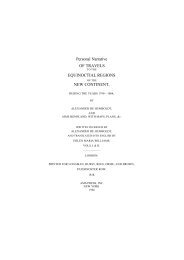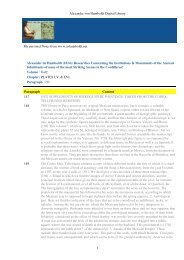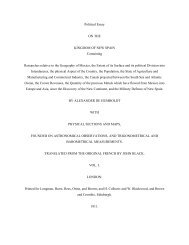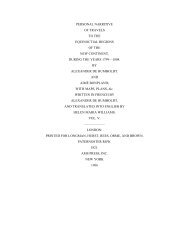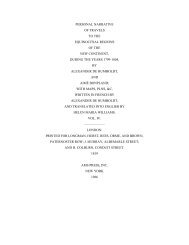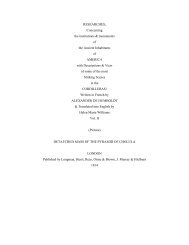See the complete document here
See the complete document here
See the complete document here
You also want an ePaper? Increase the reach of your titles
YUMPU automatically turns print PDFs into web optimized ePapers that Google loves.
DISCOVERIES IN THE CELESTIAL SPACES. 301<br />
e<strong>the</strong>r. 'Seb my Examen Crit de VHist. cle la Geogra;phie,<br />
t. iii.. p. 154-158 and 225-227.)<br />
GREAT DISCOVERIES IN THE HEAVENS BY THE APPLICATION OF THE<br />
TELESCOPE.—PRINCIPAL EPOCHS IN THE HISTORY OF ASTRONOM'i!<br />
AND MATHEMATICS, FROM GALILEO AND KEPLER TO NEWTON ANli<br />
LEIBNITZ. — LAWS OF THE PLANETARY MOTIONS AND GENERAL<br />
THEORY OF GRAVITATION.<br />
AfteFc having endeavored to enumerate <strong>the</strong> most distinctly<br />
defined periods and stages of development in <strong>the</strong> history of <strong>the</strong><br />
contemplation of <strong>the</strong> universe, we have proceeded to delineate<br />
<strong>the</strong> epoch in which <strong>the</strong> civilized nations of one hemisp<strong>here</strong> hecame<br />
acquainted with <strong>the</strong> inhabitants of <strong>the</strong> o<strong>the</strong>r. The pe<br />
riods of <strong>the</strong> greatest discoveries in sjoace over <strong>the</strong> surface of<br />
our planet was immediately succeeded by <strong>the</strong> revelations of<br />
rare manusci'ipt of Bartholorae de las Casas, I would wish to embody in<br />
this long note what I did not employ in 1839 in my Examen Critique<br />
t. v., p. 178-217. The conviction wlaich I <strong>the</strong>n expressed, in <strong>the</strong> same<br />
volume, p. 217 and 224, has remained unshaken. '' W<strong>here</strong> <strong>the</strong> desig-<br />
nation of a large continent, generally adopted as such, and consecrated<br />
by <strong>the</strong> usage of many ages, presents itself to us as a monument of human<br />
it is<br />
injustice, natural that we should at first sight attribute <strong>the</strong><br />
cause to <strong>the</strong> person who would appear most interested in <strong>the</strong> matter.<br />
A careful study of <strong>the</strong> <strong>document</strong>ary evidence has, however, show^n<br />
that this supposition in <strong>the</strong> present instance is devoid of foundation, and<br />
that <strong>the</strong> name of America has originated in a distant region (as, for instance,<br />
in France and Germany), owing to many concurrent circum<br />
stances which appear to remove all suspicion from Vespucci. Here<br />
historical criticism stops, for <strong>the</strong> field of unknown causes and possible<br />
moral contingencies does not come within <strong>the</strong> domain of positive history.<br />
We <strong>here</strong> find a man w^ho, duinng a long life, enjoyed <strong>the</strong> esteem<br />
of his cotemporaries, raised by his attainments in nautical astronomy<br />
to an honorable employment. The concurrence of many fortuitous<br />
circumstances gave him a celebrity which has weighed upon his memo-<br />
ry, and helped to throw discredit on his character. Sucli a position is<br />
indeed rare in <strong>the</strong> history of human misfortunes, and affords an instance<br />
of a moral stain deepened by <strong>the</strong> gloiy of an illustrious name. It seem.s<br />
most desirable to examine, amid this mixture of success and adversity,<br />
what is owing to <strong>the</strong> navigator himself, to <strong>the</strong> accidental errors arising<br />
from a hasty supervision of his writings, or to <strong>the</strong> indiscretion of dan<br />
gerous friends." Copernicus himself contributed to this dangerous<br />
celebrity, for he also ascribes <strong>the</strong> discovery of <strong>the</strong> new part of <strong>the</strong> globe<br />
to Vespucci. In discussing <strong>the</strong> " centrum gravitatis'^ and " centrum<br />
magnifudinis" of <strong>the</strong> continent, he adds, " magis id erit clarum, si ad<br />
deiitur insuljE oetate nostra sub Hispaniarum Lusitaniseque principibus<br />
repertse et prasertim America ab inventore denominata navium pra.'fecto,<br />
quera, ob iucompertam ejus adhuc magnitudinem, alterum orbem<br />
de Revolnttonibus Orbium Cables'<br />
teiTarum putent." {Nicolai Copej-nici<br />
tium. libri sex, 1.513, p. 2, a.)




